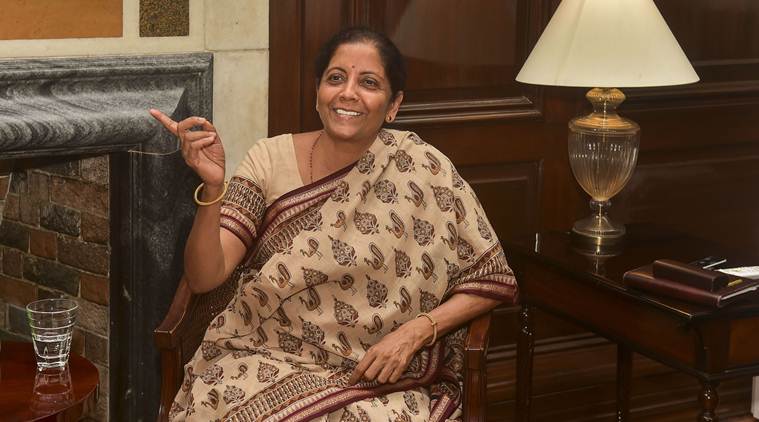
Nirmala Sitharaman took charge as India’s first woman full-time Finance and Corporate Affairs Minister Friday and her task seems cut out. Data on GDP released within a few hours of her occupying the seat in North Block showed the growth rate for January-March 2019 slipping to 5.8 per cent compared to 8.1 per cent in the corresponding period last year.
This is the lowest growth rate in 20 quarters and puts India behind China after almost two years. The rate was lower than this at 5.3 per cent in the last quarter of UPA II or January-March 2013-14.
For the full year 2018-19, the economy is estimated to have slowed down to 6.8 per cent, lower than the original estimate of 7 per cent and 7.2 per cent recorded in 2017-18.
During the last financial year, growth rates sequentially dropped from 8 per cent in Q1 to 7 per cent in Q2 to 6.6 per cent in Q3 and 5.8 per cent in Q4. This reflected in other leading indicators such as automobile sales, factory output and core sector growth.
With the liquidity crisis in the NBFC sector yet to be comprehensively addressed, consumer expenditure, including discretionary spending, has been adversely impacted. Private investment has remained weak during the year, also consistently dropping over the last three quarters from 9.8 per cent in Q2 to 8.4 per cent in Q3 and 7.2 per cent in Q4.

The slowdown is accompanied by weakness on the job front too, with the unemployment rate for 2017-18 at 6.1 per cent, according to the Periodic Labour Force Survey (PLFS), also released Friday along with GDP data. This report was withheld by the government despite being cleared by the National Statistical Commission, an autonomous body, in December 2018.
The economic slowdown spells a challenge for the government in its second term since there is limited fiscal room to boost growth through higher government expenditure. There will be higher expectations from the RBI to push growth by front-loading policy rate cuts. Economists expect the RBI to cut the rate in its upcoming review next Thursday.
‘Agriculture, forestry and fishing’ sector’s Gross Value Added (GVA) growth contracted 0.1 per cent in January-March from 6.5 per cent in the previous financial year, while that for the manufacturing sector slowed to 3.1 per cent in January-March as against 9.5 per cent in the previous fiscal. The construction sector, however, recorded an uptick with GVA growth of 7.1 per cent in the fourth quarter of 2018-19 against 6.4 per cent in previous financial year.

For 2018-19, the manufacturing sector grew 6.9 per cent as against 5.9 per cent in the previous financial year, while agricultural growth faltered to 2.9 per cent from 5 per cent in the previous fiscal.
“Clearly the economy is slowing down and these numbers would be a cause of worry for the new central government. Given the budgeted fiscal deficit at 3.4 per cent of GDP, Ind-Ra believes the headroom available to provide fiscal stimulus is limited. However, given the current inflation level which is well within the target range, RBI may go for a rate cut in the forthcoming second bi-monthly monetary policy review,” said Devendra Kumar Pant, Chief Economist, India Ratings & Research.
[“source=indianexpress”]
The post Nirmala Sitharaman gets Finance, task cut out: at 5.8%, lowest growth in 20 quarters appeared first on Dcresource.